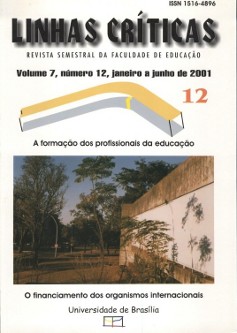A experiência de cooperação entre o Brasil e o Banco Mundial Redefinindo o papel da educação e do professor
DOI:
https://doi.org/10.26512/lc.v7i12.2888Keywords:
Assistência internacional;, Formação do professor;, Ensino básicoAbstract
O presente texto analisa as orientações políticas definidas pelo Banco Internacional de Reconstrução e Desenvolvimento (Banco Mundial) para a formação e desempenho do professor de ensino básico. Para tanto, examina os documentos políticos do Banco para a educação brasileira ao longo de 30 anos, assim como os textos que orientam seus projetos de financiamento desenvolvidos em parceria com o governo federal e alguns Estados brasileiros. Mostra como o Banco se empenha em fomentar novos métodos de organização e gestão escolar no âmbito do ensino básico. Comenta a base gerencialista' dessa reorganização institucional e suas conseqüências para a nova concepção de qualidade da escola, medida pela sua produtividade, onde o professor se insere como aplicador de técnicas e métodos racionais de ensino.
Downloads
Downloads
Published
How to Cite
Issue
Section
License
Copyright (c) 2016 Linhas Críticas

This work is licensed under a Creative Commons Attribution 4.0 International License.
Authors who publish in this journal agree to the following terms:
-Authors maintains the copyright and grants the journal the right of first publication, the work being simultaneously licensed under the Creative Commons Attribution License which allows the sharing of the work with recognition of the authorship of the work and initial publication in this journal.
- Authors are authorized to enter into additional contracts separately, for non-exclusive distribution of the version of the work published in this journal (eg publish in institutional repository or as a book chapter), with acknowledgment of authorship and initial publication in this journal.
-Authorers are allowed and encouraged to publish and distribute their work online (eg in institutional repositories or on their personal page) at any point before or during the editorial process, as this can generate productive changes as well as increase the impact and the citation of published work (See The Effect of Free Access).



